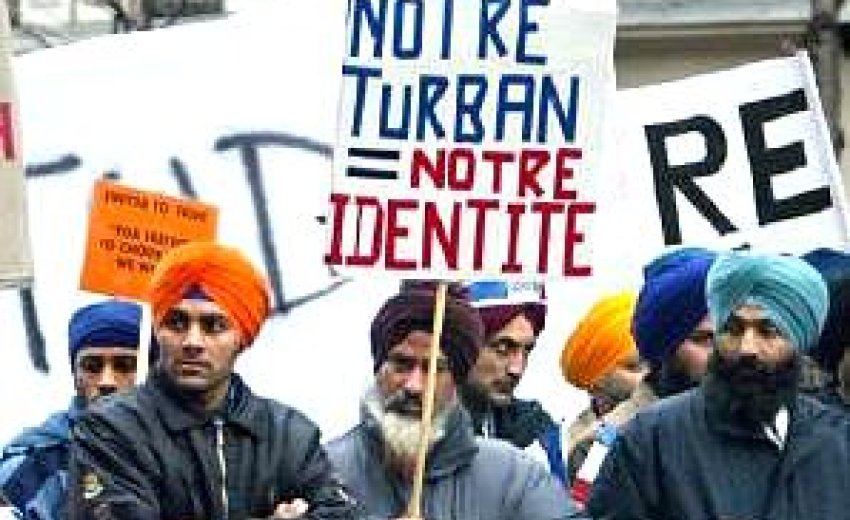|
While immediate economic reforms are crucial in the current climate, any new captain also cannot avoid the social reforms required for long-term stability.
President Jacques Chirac signed a law in 2004 that banned wearing clothing or symbols in state schools that “exhibit conspicuously a religious affiliation.” Presented as neutral and uniform, this ban prohibited all items like “a large cross, a veil, or skullcap.” ? The conspicuous exception for the wearing of a small cross is at best a smokescreen: firstly, most Christians do not see the wearing of a cross as an inextricable part of their daily practice and secondly, those who do can simply wear a discreet one. Therefore, the ban has an immediate and disparate impact on specific communities: Muslims wearing hijabs (headscarves), Sikhs with dastaars (turbans) and Jews with yarmulkes (skullcaps). The ban’s ostensibly 'secular' classification is thus the first myth to be undone. Secondly, especially for a socialist government, it is imperative to note the classist dimensions of such a ban: students whose parents could not afford alternate expensive private schools were the ones truly forced to choose between maintaining their religious identity or receiving a basic education. Should Muslim, Sikh, and Jewish children put in this impossible bind find solace in the fact that they could have gone to private schools, only if their parents had the money? And should the children of parents who left their original homes for physical and/or economic security, and who have diligently contributed to French society and its economy since then, quietly accept their second-class status for ever after?
The wind of change must touch all in France. Minorities must now receive a chance to build a proper self-image and show true allegiance to their national ethic, rather than face the humiliating and inflammatory insistence on choosing ‘flag before faith.’ The discussion must not be about the religious versus the irreligious. The discussion must be about a nation charting a path of socio-economic change in a dangerous time. The discussion must be about reform. |

 15 June 2012: French President-elect François Hollande has won on promises of “reform” and “social justice.” While immediate economic reforms are crucial in the current climate, any new captain also cannot avoid the social reforms required for long-term stability. Attempts at forced assimilation, such as the ban on religious dress in public schools, prevent French minorities from becoming complete and productive citizens, disproportionately affect the poor and disenfranchised, and sow the seeds for further social--and necessarily economic--disturbance. By re-evaluating such wrong-headed policies the Hollande government can help France re-embrace its legacy of liberté, égalité, fraternité. Now is the time for courage.
15 June 2012: French President-elect François Hollande has won on promises of “reform” and “social justice.” While immediate economic reforms are crucial in the current climate, any new captain also cannot avoid the social reforms required for long-term stability. Attempts at forced assimilation, such as the ban on religious dress in public schools, prevent French minorities from becoming complete and productive citizens, disproportionately affect the poor and disenfranchised, and sow the seeds for further social--and necessarily economic--disturbance. By re-evaluating such wrong-headed policies the Hollande government can help France re-embrace its legacy of liberté, égalité, fraternité. Now is the time for courage. Finally, it is time that France withdraws the low-brow defense that such bans on Muslim modesty clothing will limit the influences of radical Islam and/or terrorism. Neglecting Muslim ghettos and the smouldering anger within, while undressing young schoolgirls from the head up, is unlikely to thwart determined terrorists and likely in fact to fuel dangerous angst. France has already witnessed the consequences of that neglect ? during the 2005 riots, ignited by the deaths of two Muslim teenagers in a working class locality. The ensuing widespread, prolonged and racially charged violence was marked by extensive loss of property.
Finally, it is time that France withdraws the low-brow defense that such bans on Muslim modesty clothing will limit the influences of radical Islam and/or terrorism. Neglecting Muslim ghettos and the smouldering anger within, while undressing young schoolgirls from the head up, is unlikely to thwart determined terrorists and likely in fact to fuel dangerous angst. France has already witnessed the consequences of that neglect ? during the 2005 riots, ignited by the deaths of two Muslim teenagers in a working class locality. The ensuing widespread, prolonged and racially charged violence was marked by extensive loss of property.